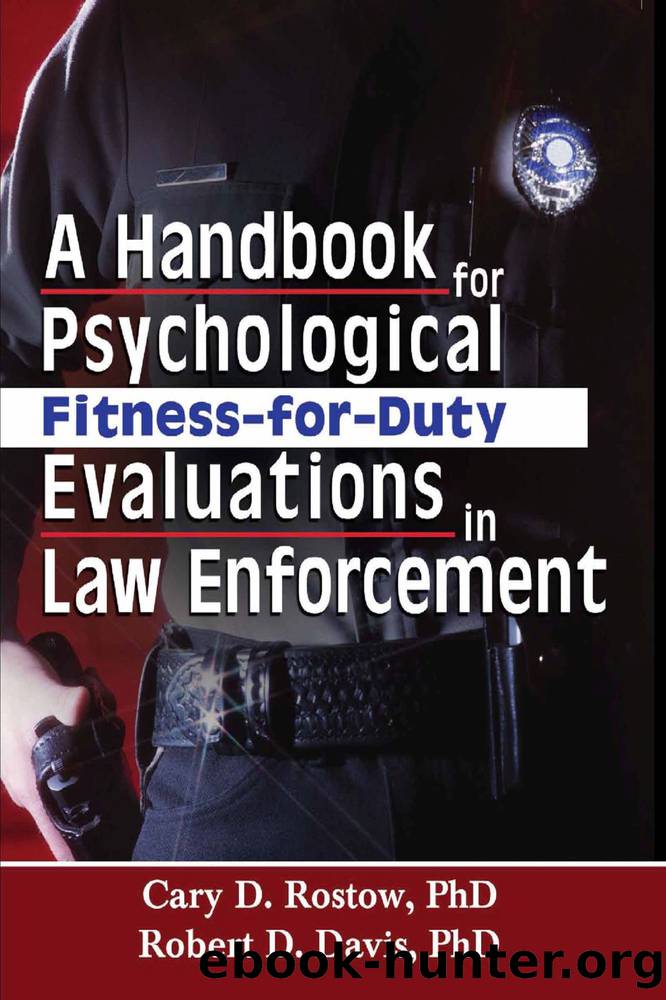A Handbook for Psychological Fitness-For-Duty Evaluations in Law Enforcement by Rostow Cary D.;Davis Robert D.; & Robert D. Davis

Author:Rostow, Cary D.;Davis, Robert D.; & Robert D. Davis [Rostow, Cary D. & Davis, Robert D.]
Language: eng
Format: epub
Publisher: Taylor & Francis Group
Published: 2022-08-15T00:00:00+00:00
Improper FFDE Referrals
Corporal Charles of the Anytown Police Department reported to his supervisor that he (Charles) was being âwatchedâ at his desk assignment by nonspecific others in a âthreatening manner.â The departmental psychiatrist examined Corporal Charles and reported that he was âfit for dutyâ (i.e., not disabled by mental illness), but included a list of abstract concerns about Charlesâ âemotional stabilityâ in the official report. Corporal Charles was allowed to return to work under the conditions that he submit to âcounselingâ and that the mental health provider submit a monthly report on his progress. Corporal Charles refused to pay for counseling and pointed out that the departmental report had found him âfit for dutyâ and, therefore, presumably not in need of treatment. He was suspended and eventually discharged for refusing a direct order.
Corporal Charles then filed a complaint with the Equal Opportunity Employment Commission, which has the responsibility to enforce a number of federal civil rights laws, including the Rehabilitation Act of 1973 and the Americans with Disabilities Act. Since Corporal Charles had been declared âfit for dutyâ by the departmental FFDE provider, he challenged the âbusiness necessityâ (see Chapter 14) of required treatment and the embarrassing monthly mental heath reports to the department. The EEOC demanded that the department justify the order for treatment with proof of risk to the public, or other foreseeable liability, which was thought to stem from Corporal Charlesâ medical condition.
Failing to receive such evidence, the EEOC ruled that the department had exceeded its authority by requiring post-FFDE treatments and examinations, since no connection appeared evident between the fitness-for-duty report and the order to report to a treatment provider. Since employees may not be disciplined for refusing improper requests for medical examinations or treatment, Corporal Charles was restored to his police position and received back pay and benefits. To make matters more embarrassing and expensive, the Anytown PD was ordered to conduct a âsupplemental investigationâ to determine whether compensatory damages should be awarded to Corporal Charles. The department was also told to arrange for sixteen hours of staff training in the legal rights of employees who are believed to suffer medical or psychological disability within a public agency.
This case is an example of the difficulties that departments must anticipate before a FFDE procedure is introduced into the personnel management system. The failure to demonstrate the risk that Corporal Charles posed to the well-being of others or to the effective functioning of the department led ultimately to the EEOC's rejection of the recommended plan. Confusion about the goals and proper methods of conducting an FFDE was compounded by a lack of awareness of legal requirements regarding the procedure on the part of both the department and the FFDE provider. In the following section, a brief review of federal laws that impinge upon the use of FFDEs is offered so that the LE executive involved in such a procedure may interact in an informed manner with those who propose to offer FFDE services.
Download
This site does not store any files on its server. We only index and link to content provided by other sites. Please contact the content providers to delete copyright contents if any and email us, we'll remove relevant links or contents immediately.
The Art of Thinking Clearly by Rolf Dobelli(9916)
The 5 Love Languages: The Secret to Love That Lasts by Gary Chapman(9282)
Mindhunter: Inside the FBI's Elite Serial Crime Unit by John E. Douglas & Mark Olshaker(8702)
Becoming Supernatural by Dr. Joe Dispenza(7836)
The Road Less Traveled by M. Scott Peck(7279)
Nudge - Improving Decisions about Health, Wealth, and Happiness by Thaler Sunstein(7244)
Mastermind: How to Think Like Sherlock Holmes by Maria Konnikova(6937)
Enlightenment Now: The Case for Reason, Science, Humanism, and Progress by Steven Pinker(6875)
Win Bigly by Scott Adams(6828)
The Way of Zen by Alan W. Watts(6289)
Factfulness: Ten Reasons We're Wrong About the World – and Why Things Are Better Than You Think by Hans Rosling(4488)
The State of Affairs by Esther Perel(4485)
Gerald's Game by Stephen King(4376)
Man's Search for Meaning by Viktor Frankl(4276)
The Confidence Code by Katty Kay(4040)
Thinking in Bets by Annie Duke(3998)
The Worm at the Core by Sheldon Solomon(3325)
Hidden Persuasion: 33 psychological influence techniques in advertising by Marc Andrews & Matthijs van Leeuwen & Rick van Baaren(3292)
Enlightenment Now by Steven Pinker(3274)
